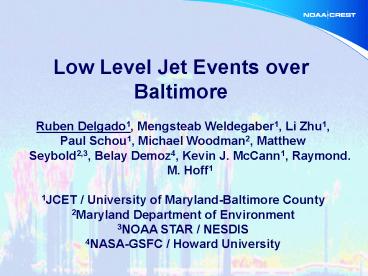Low Level Jet Events over Baltimore - PowerPoint PPT Presentation
1 / 27
Title: Low Level Jet Events over Baltimore
1
Low Level Jet Events over Baltimore
Ruben Delgado1, Mengsteab Weldegaber1, Li
Zhu1, Paul Schou1, Michael Woodman2, Matthew
Seybold2,3, Belay Demoz4, Kevin J. McCann1,
Raymond. M. Hoff1 1JCET / University of
Maryland-Baltimore County 2Maryland Department of
Environment 3NOAA STAR / NESDIS 4NASA-GSFC /
Howard University
2
Three Types of Transport That Affect MD
Ozone 8-Hour Peak AQI
- Short range
- -VA ? MD ? PA.
- Long range
- -100-1000s of miles
- -Generally from W or NW
- Nocturnal Low Level Jets
- -100s of miles
- -SW to NE along the Atlantic
3
Low Level Jets
- Well documented phenomenon around the world.
- Blackadar (1957)-the nocturnal LLJ forms as the
release of daytime convective turbulent stresses
allows nighttime winds above a stable boundary
layer to accelerate to supergeostrophic wind
speeds. - The turbulence generated by this wind shear can
induce nocturnal mixing events and enhance
surface-atmosphere exchange, thereby influencing
the dispersion of pollutants near the surface.
4
Low Level Jet (LLJ) Formation
- Forms between the Appalachian Mountains
Atlantic Ocean. - Sunset ground cools/air poor conductor of
heat/air close to ground cools too (100 meters). - Air over mountains cools more than air at same
elevation near coast. - Temperature gradient induces a southerly wind a
few hundred meters above the ground.
Cool Air
Warm Air
5
UMBC Atmospheric Lidar Group
ALEX
ELF
6
Aug. 3, 2007 MDE Wind Profiler
7
(No Transcript)
8
(No Transcript)
9
(No Transcript)
10
WRF Horizontal Wind 2100UTC 02Aug 1200UTC
03Aug
11
(No Transcript)
12
(No Transcript)
13
Aug. 3, 2006 MDE Wind Profiler
14
(No Transcript)
15
WRF Horizontal Wind
16
CALIPSO August 3, 2006
17
Aug. 3, 2006
18
(No Transcript)
19
Aug. 5, 2005 MDE Wind Profiler
20
WRF Horizontal Wind
21
Aug. 5, 2005 ELF vs. O3 Stations
22
Summary
- Lidar measurements key understand the vertical
distribution of aerosol in the atmosphere and to
determine their impact on the transport of haze,
dust, smoke, and pollution in weather and climate
variability. - Weather Research and Forecasting model show
agreement with the wind profiler results as to
the location and general character of the LLJ
over the Baltimore-Washington region. - Lidar data sets are unique in that it captures
the development and structure of the boundary
layer associated with a low-level jet and help
explain observed pollutant distribution.
23
Acknowledgements
Maryland Department of the Environment (Contract
Number U00P7201032) National Oceanic and
Atmospheric Administration City College of New
York Foundation CREST Contract (Contract Number
NA06OAR4810162) Joint Center for Earth Systems
Technology (JCET) (NASA Grant NH04ZYS004N) The
statements contained within the presentation are
not the opinions of the funding agencies or the
U.S. government, but reflect the authors
opinions.
24
Aerosol Backscatter coefficient, ßA
where K all range independent parameters - a
system constant bR(z) Rayleigh backscatter
coefficients aA(z), aR(z) aerosol and
Rayleigh extinction coefficients O(z) Overlap
correction (geometric overlap of field of view
and the laser beam at low altitudes)
Aerosol Lidar Ratio, SA
Optical Depth, t
25
Aug. 5, 2005
26
Aug. 3, 2006
27
Aug. 3, 2007































